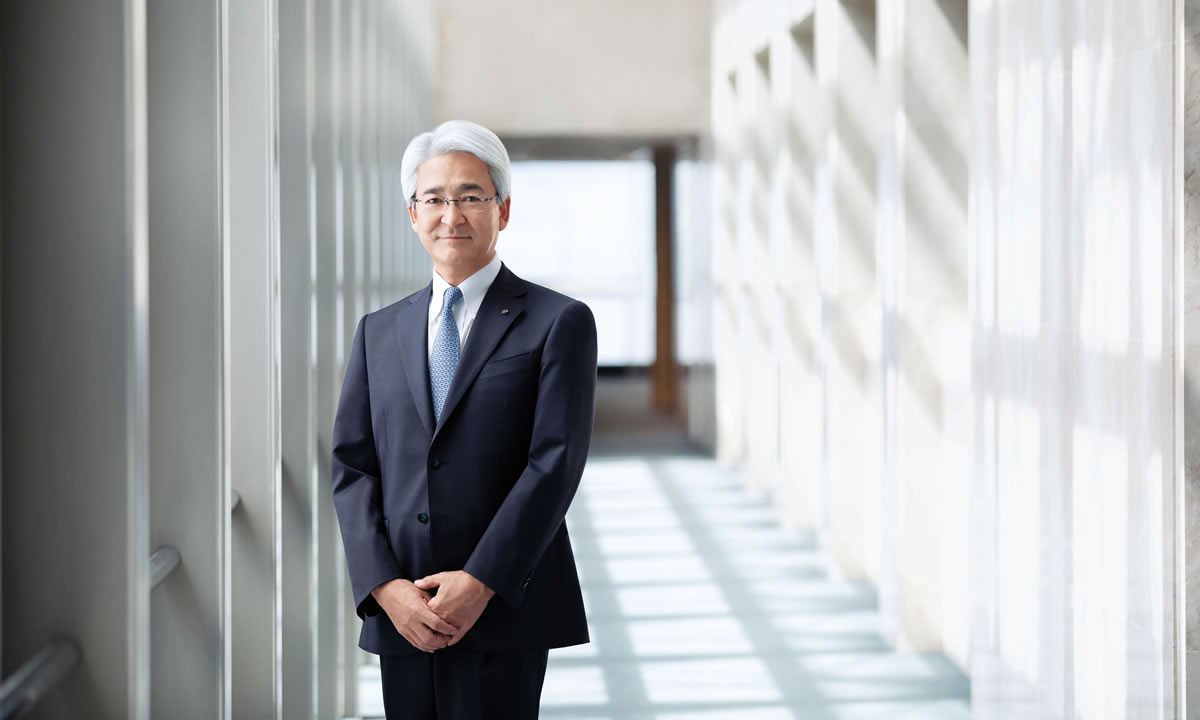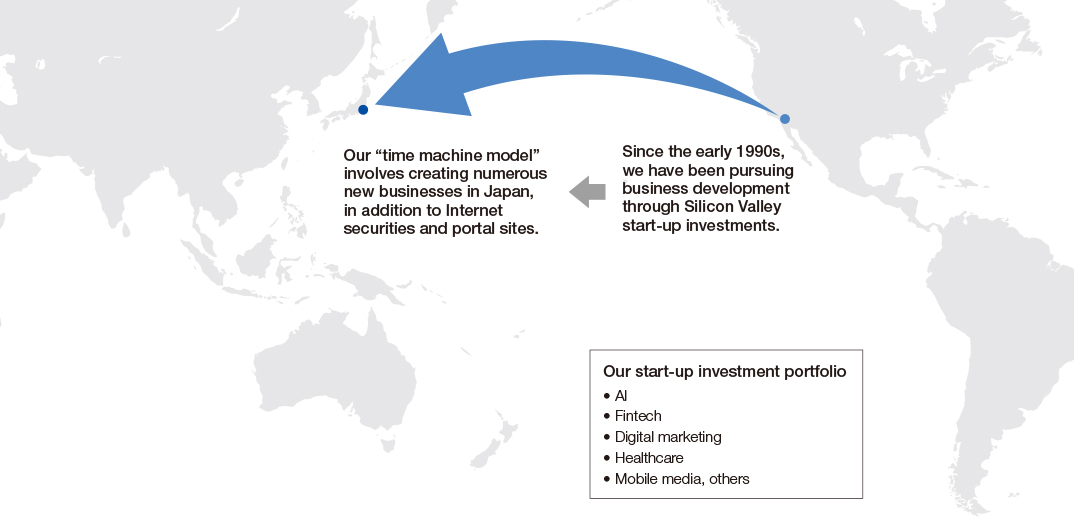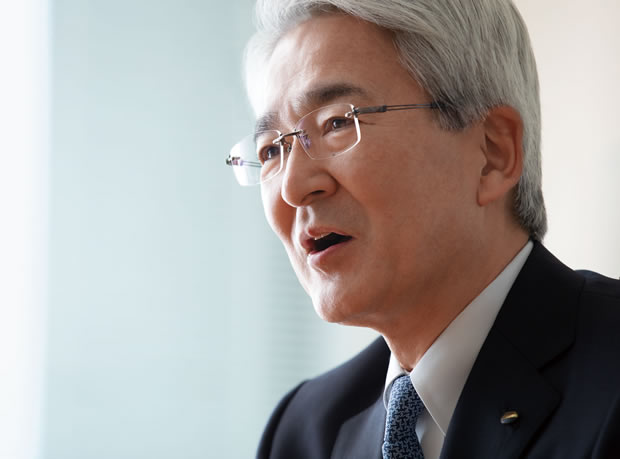COO MESSAGE

I am resolutely committed to reinventing our business, taking ITOCHU into its next generation.
I am Yoshihisa Suzuki, appointed as President and COO on April 1, 2018.
I will bear firmly in mind the history of ITOCHU, built by my predecessors, as I work diligently on a daily basis to increase our corporate value.
I would like to take this opportunity to offer my greetings to our shareholders, investors, and all other stakeholders.
Yoshihisa Suzuki
President & Chief Operating Officer
Humility, Study, Challenge
At university, I studied aeronautical engineering, and I yearned to get a job where I would be involved with aircraft. When I was selected to work at ITOCHU and assigned to the Aerospace and Space Department, I had the chance to fulfill this desire and become involved in the aerospace business.
This was in the 1980s, and in Europe satellite launches were moving into the private sector. Few people in Japan thought this would turn into a business, but ITOCHU believed in its business potential and, accordingly, launched a space-related business. Several years later, satellite launches were privatized in Japan as well, and ITOCHU obtained an agency contract for its satellite launch service. In this project, I became acutely aware of the need for general trading companies (sogo shosha) to be on the front lines of Japan’s economic growth and consistently take on challenges in new domains in Japan and overseas. Moving into cutting-edge businesses requires us to be humble and respectful of the people who already have experience in these areas. Recognizing that ITOCHU’s ability to adapt easily to changing environments was due to its belief in the mantra of “be humble, do not neglect your studies, and continue to take on challenges without fearing failure,” I embraced this as my personal creed, which I have followed to this day.
Remaining Alert for Danger, Even in Times of Peace
I have taken on challenges that ended up as major failures. In April 2007, I was appointed CEO of ITOCHU International Inc. (III), a US subsidiary. The US financial industry was enjoying an unprecedented boom at the time, and III’s operating results were favorable. I took on the challenge of adopting an investment banking model that ITOCHU did not have at the time. Just as we were introducing this model, the global financial crisis hit, the corporate value of our investees slumped instantaneously, and III’s operating results plunged. I learned a number of things through this experience. First, I learned that ITOCHU’s investments should be those that add value to its existing business and that expand its trading and other businesses, not those that adopt the investment banking model of pursuing capital gains. Also, I learned that the time when business is going well is precisely when you should remember to prepare for the worst. Since that time, I have been a firm believer in “remaining alert for danger, even in times of peace.”
In March 2011, I stepped down as that company’s managing executive director and transferred to JAMCO Corporation, which makes aircraft interiors. This was a time of extremely high yen appreciation, and the company was facing difficulties due to the damage its factory sustained in the Great East Japan Earthquake. Amid this situation, the entire company pulled together to maintain the levels of quality and delivery times that are essential to a manufacturer, while at the same time pursuing relationships of trust with customers. These efforts led to a significant improvement in earning capacity, and in March 2015 the company successfully changed its designation to the First Section of the Tokyo Stock Exchange. I will never forget the employees who encouraged each other and the people who provided support as we worked to overcome the difficulties.
Taking on the Role of Reinventing the Company into the Next Generation
In April 2016, I returned to ITOCHU, where I was appointed President of the ICT & Financial Business Company. I understand that returning to the parent company after having been dispatched and transferred to other Group companies is generally atypical in the business world. Still, this practice is not unusual at ITOCHU, which has a corporate culture of evaluating people fairly, whether they have been successful at ITOCHU itself or at an operating company. In FYE 2018, we posted the highest level of consolidated net profit to date. It is no exaggeration to say that this result, which includes the profit contribution from operating companies, is attributable to the successful management of ITOCHU on a consolidated basis, and of putting the right people in the right job, as occasion demands.
In January 2018, President Okafuji (now Chairman & CEO) spoke to me about taking over the position of President. I was hugely surprised, but when I learned that the plan was, from April, for Mr. Okafuji to take over the role of formulating future strategy for the entire ITOCHU Group as Chairman & CEO and for me to take an operational role with responsibility for working with the individual Division Companies, I became confident that I could take on the position. I recognize that reinventing the Company’s business into the next generation is of particular importance. Also, this position means that I will be sharing some of the operations that Mr. Okafuji has handled to date, and I hope that one plus one will deliver results greater than two.
A Clumsy Elephant
For the past two years, Mr. Okafuji has been strongly aware of the need to reinvent ITOCHU’s business in response to the digital revolution. I share his sense of crisis and his view about the need for us to become a “next-generation merchant.”
Overseas, the digital revolution is moving forward at breakneck speed. In particular, China, where regulatory hurdles are low, is serving as a large-scale test site of leading-edge technologies for the global economy. For instance, in China companies are creating business models that directly connect manufacturing and retailing in the non-resource sector, particularly the consumer-related sector, which is one of ITOCHU’s fortes. This breakthrough business model that has emerged in China, is spreading through Asia, the Near and Middle East, and Africa, and will arrive in Japan sooner or later. Accordingly, ITOCHU needs to quickly move forward with a business model that will become outdated. I feel a sense of crisis because I recognize that particularly when business is going well companies tend to behave like clumsy elephants. My first task, therefore, is to encourage every employee to understand the need for transformation from the core of their being and to reawaken our erstwhile “hungry spirit.” I will do my best to achieve this goal.
Giving Our Business a "Version Upgrade" by Leading-Edge Technology
Our new medium-term management plan, “Brand-new Deal 2020,” calls for us to become a next-generation merchant, underpinned by “reinvented business” and “reinvented work-styles.” We aim to achieve a new generation of “sampo yoshi,” realizing sustainable growth by improving employees’ job satisfaction, enhancing society’s evaluation of the Company by achieving further profit growth, and realizing a virtuous cycle whereby society’s evaluation of the Company attracts excellent employees and new customers. (→New Medium-Term Management Plan)![]()
One of our basic policies as a next-generation merchant is to reinvent businesses in all domains, centered on the Business Innovation Unit, which is overseen by the Chief Strategy Officer (CSO).
By “reinvented business,” we do not mean fields entirely divorced from ITOCHU’s conventional businesses, nor do we refer to areas requiring large-scale investment. Rather, these areas of business are broad-ranging and ones that we have cultivated over a long period of time. We will look at these businesses from a fresh perspective, append leading-edge technology—sometimes through partnerships, and efficiently achieve a “version upgrade” on these businesses. (→Toward "Reinvented Business")For instance, ITOCHU FEED MILLS CO., LTD. and NTT TechnoCross Corporation have jointly developed Digital Mekan, which uses AI technology in an app to guess a pig’s weight—something that previously required an expert’s eye. This product is a good example of a “version upgrade,” as it uses technology to achieve a major boost in efficiency to solve a problem that has plagued people in the hog industry for some time: accurately judging a pig’s weight at time of shipping, to avoid differences in selling prices. Also, we have added UK company Moixa’s AI in the platform technology software used in storage batteries to our electricity storage system to provide an optimal electricity storage service. This example shows how leading-edge technology can be used to advance an existing business.
New businesses such as these can be created in a variety of domains, including mobility, agritech, regenerative medicine, advanced logistics, new materials, and fintech (tech-based financial services). By steadily nurturing these small seeds of business, some will grow into major businesses for ITOCHU, so we should steadily increase the number of projects of this nature.
Taking the Industry Lead in Start-Up Investments
One important way to achieve a next-generation shift is through start-up investments. ITOCHU’s history of start-up investing dates back to the dawning of the Internet, in the early 1990s. At that time, we invested in a variety of projects in Japan and overseas, both through funds and directly. When the Internet surged in popularity in the 2000s, the “time machine model” developed in Japan using leading technology from the United States generated new businesses, such as Internet securities and search portal sites. Today, we have created an extensive portfolio of start-up investments across numerous genres, including AI, fintech, and digital marketing.
These results and history have enabled us to form networks with leading funds in Silicon Valley and other locations and cultivate expertise in start-up investments. Although our scope of investment is by no means large, we believe we are now able to make start-up investments efficiently. One such example is our strategic investment in Inagora Inc., which aims to enter the cross-border e-commerce market targeting China. Rather than simply targeting capital gains and dividends in the manner of a private equity fund, with our start-up investments we aim to invest in adding new technologies to existing businesses and expand a variety of future business opportunities. (→How ITOCHU Differs from a General Private Equity Fund)![]()

Remembering Our Origins
Earlier, I touched on the idea of humility, which I believe is of particular importance from the perspective of a merchant. A sogo shosha serves as a middleman—the midstream business is our livelihood. For this reason, we have customers at both the upstream and downstream ends of our business. No matter how involved we become in advancing our business model or how favorable our results may be, we must not forget that we are at our nature, merchants, and we should maintain a sense of humility. I believe this concept is incorporated into the management philosophy of “sampo yoshi” (good for the seller, good for the buyer, and good for society) that we have inherited from the merchants of Ohmi.
As indicated by the addition of “society” to our philosophy of buying and selling, the importance of providing value to society is ingrained in the “sampo yoshi” philosophy we have followed as we have engaged in trade over 160 years. Nowadays, we are building value chains in a host of industries throughout the world. Developing our business in a lasting manner requires that we satisfy not only customers at both ends of our business, but also broader society. In this sense, “society” refers to the consumers that lie beyond our customers, the local communities housing businesses where we are expanding our value chains, the global environment, and a wide range of other stakeholders. As our corporate message indicates, we truly have “infinite missions.”

A Time to Take on Challenges without Fear
The Darwinian phrase “survival of the fittest” does not mean that organisms with the best biological capabilities survive. Rather, it emphasizes the importance of adapting to changes in the environment. This idea is fitting for sogo shosha. Instead of asset scale or the physical prowess of financial conglomerates, our emphasis needs to be on adapting moment by moment to changes in the operating environment. I am convinced that ITOCHU can adapt flexibly and swiftly to the changing environment. This ability is based on our corporate culture, which emphasizes that “failing and trying again is better than not failing.” This willingness to take on challenges is valid for sogo shosha of all times and sizes: at the time of our founding by Chubei Itoh, a merchant of Ohmi who started business by peddling linen; in the 1980s when the launch of communications satellites was privatized (as mentioned earlier); in the 1990s when we entered the convenience store business by investing in FamilyMart Co., Ltd.; and in recent days with Dole business and large-scale investments in the CITIC Group and the CP Group.
By unleashing the potential of our “DNA of taking on challenges” and fulfilling my mission through the business principles of “earn, cut, prevent,” we will create the next-generation ITOCHU. I ask all our shareholders, investors, and other stakeholders for your ongoing support of our endeavors.
